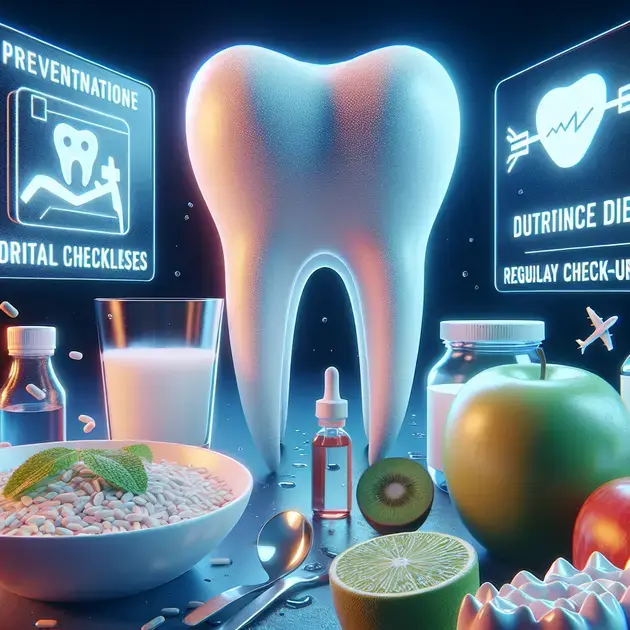Tooth decay is a common yet serious oral health issue that affects many people worldwide. Understanding the dangers of tooth decay is essential for maintaining good oral hygiene and preventing further dental problems. From cavities to gum disease, untreated tooth decay can lead to various complications and affect overall well-being.
According to recent studies, poor oral health due to neglected tooth decay can also contribute to the development of other health problems such as heart disease and diabetes. It is crucial to prioritize regular dental check-ups and practice proper oral care habits to prevent tooth decay and its associated risks. Stay informed about the dangers of tooth decay to protect your smile and overall health.

Recognizing the Signs of Tooth Decay
Recognizing the Signs of Tooth Decay
Tooth decay is a common dental issue that can lead to serious complications if left untreated. Recognizing the signs of tooth decay early on can help prevent further damage and maintain good oral health. Here are some common signs of tooth decay to watch out for:
Tooth Sensitivity
If you experience sensitivity to hot or cold foods and drinks, it could be a sign of tooth decay. This sensitivity occurs when the enamel on your teeth begins to wear away, exposing the sensitive inner layers of the tooth.
Toothache
A persistent toothache, especially when biting down on food, can indicate tooth decay. The pain may vary in intensity and could be a sign that the decay has reached the inner layers of the tooth where the nerves are located.
Visible Holes or Pits
Inspect your teeth regularly for any visible holes, pits, or dark spots. These are clear signs of decay and should be addressed by a dentist as soon as possible to prevent further damage.
Bad Breath or Bad Taste
Chronic bad breath or a persistent bad taste in your mouth can be a sign of tooth decay. Bacteria from the decayed tooth can cause an unpleasant odor or taste in your mouth that brushing alone may not eliminate.
Changes in the Color of Your Teeth
If you notice any white, brown, or black spots on your teeth, it could be a sign of decay. These discolorations indicate the presence of cavities and should be evaluated by a dentist.
Preventive Measures for Tooth Decay
Preventive Measures for Tooth Decay
Preventing tooth decay is essential for maintaining good oral health and avoiding costly dental treatments. By following these preventive measures, you can reduce your risk of developing cavities and other dental issues:
Brushing and Flossing Regularly
Brushing your teeth at least twice a day and flossing daily helps remove plaque and food particles that can lead to decay. Use a fluoride toothpaste and a soft-bristled toothbrush for optimal cleaning.
Using Fluoride Products
Fluoride helps strengthen tooth enamel and prevent cavities. Use a fluoride mouthwash or ask your dentist about professional fluoride treatments to protect your teeth from decay.
Eating a Balanced Diet
Avoid sugary and acidic foods that can erode tooth enamel and promote decay. Instead, focus on eating a balanced diet rich in calcium, phosphorus, and vitamin C to support strong and healthy teeth.
Regular Dental Check-ups
Visit your dentist for regular check-ups and professional cleanings to detect and address any signs of tooth decay early on. Your dentist can also provide personalized recommendations for maintaining good oral hygiene.
Using Dental Sealants
Dental sealants are thin protective coatings applied to the chewing surfaces of molars to prevent decay. Ask your dentist about sealants for you or your children to help protect against cavities.
The Link Between Tooth Decay and Overall Health
The Link Between Tooth Decay and Overall Health
Research has shown that there is a strong connection between tooth decay and overall health. Poor oral health, including untreated tooth decay, can have significant implications for your well-being beyond just your teeth. Here are some ways in which tooth decay can impact your overall health:
Cardiovascular Health
Untreated tooth decay and gum disease have been linked to an increased risk of cardiovascular issues, such as heart disease and stroke. Bacteria from the mouth can enter the bloodstream and contribute to inflammation in the arteries.
Respiratory Health
Bacteria from severe tooth decay or gum disease can be inhaled into the lungs, leading to respiratory infections and exacerbating conditions like asthma or chronic obstructive pulmonary disease (COPD).
Diabetes Management
Poor oral health, including tooth decay, can make it harder to control blood sugar levels in individuals with diabetes. Inflammation from oral infections can affect insulin sensitivity and overall diabetes management.
Pregnancy Complications
Untreated tooth decay and gum disease have been associated with pregnancy complications, including preterm birth and low birth weight. Maintaining good oral health during pregnancy is crucial for both the mother and the baby’s well-being.
Mental Health
Chronic pain and discomfort from tooth decay can impact your mental health, leading to increased stress, anxiety, and difficulty focusing on daily tasks. Addressing dental issues promptly can help improve your overall well-being.

**
Recognizing the Importance of Dental Check-ups
**
Regular dental check-ups are crucial for maintaining good oral health. These routine visits to the dentist play a significant role in preventing dental issues such as cavities, gum disease, and oral infections. During a check-up, the dentist will thoroughly examine your teeth and gums, looking for any signs of decay or other problems. They will also perform a professional cleaning to remove plaque and tartar buildup, which can contribute to tooth decay and gum disease.
Additionally, dental check-ups allow the dentist to detect any potential issues early on, before they develop into more serious problems. Early intervention can help prevent the need for extensive and costly dental procedures in the future. By staying on top of your routine dental check-ups, you can maintain a healthy smile and avoid unnecessary pain and discomfort.
It is recommended to schedule a dental check-up at least once every six months. However, some individuals may require more frequent visits depending on their oral health needs. By recognizing the importance of dental check-ups and making them a priority in your healthcare routine, you can enjoy better overall health and well-being.
Remember, prevention is key when it comes to dental health. By attending regular check-ups and practicing good oral hygiene at home, you can protect your teeth and gums for years to come.
Ensure you prioritize your dental health by scheduling your next check-up with a trusted dentist. Your smile will thank you!
**
The Role of Diet in Preventing Tooth Decay
**
Your diet plays a significant role in preventing tooth decay and maintaining overall oral health. Consuming a balanced diet that is rich in essential nutrients can help strengthen your teeth and gums, making them more resistant to decay and disease. On the other hand, a diet high in sugary foods and acidic beverages can contribute to the formation of cavities and erosion of enamel.
Foods rich in calcium, such as dairy products, leafy greens, and almonds, help maintain strong teeth and bones. Phosphorous-rich foods like meat, eggs, and fish also play a vital role in tooth remineralization and repair. Additionally, vitamin C-rich fruits and vegetables can help boost gum health and prevent gum disease.
It is important to limit your intake of sugary snacks, sodas, and other sugary beverages, as they can feed harmful bacteria in the mouth and lead to the production of acids that attack tooth enamel. Instead, opt for water, milk, or unsweetened tea to keep your teeth healthy and hydrated.
Practicing good dietary habits, such as avoiding frequent snacking and incorporating tooth-friendly foods into your meals, can go a long way in preventing tooth decay and promoting oral health. Be mindful of what you eat and make choices that support a healthy smile!
Remember, a balanced diet combined with regular dental check-ups and proper oral hygiene is the key to maintaining a beautiful and healthy smile for life.
**
Understanding the Impact of Genetics on Tooth Decay
**
Genetics can play a significant role in determining your susceptibility to tooth decay. While proper oral hygiene and regular dental check-ups are essential in preventing cavities, some individuals may be more prone to dental issues due to their genetic makeup. Factors such as the strength of tooth enamel, saliva composition, and tooth alignment can be influenced by genetics and affect your risk of developing cavities.
Individuals with weaker tooth enamel may find it harder to resist acid attacks from bacteria and sugary foods, making them more susceptible to decay. Similarly, variations in saliva production and composition can impact the mouth’s ability to neutralize acids and remineralize teeth, leading to an increased risk of cavities.
Moreover, genetic traits like tooth shape and size, as well as jaw structure, can affect how teeth align and overlap, making cleaning and plaque removal more challenging. This can create areas where bacteria thrive and contribute to the development of cavities.
While genetics can play a role in tooth decay, it is important to remember that preventive measures such as proper oral hygiene, a healthy diet, and regular dental check-ups can help mitigate genetic risks. By being proactive about your oral health and addressing any genetic predispositions, you can maintain a strong and healthy smile.
Consult with your dentist to understand how your genetic factors may impact your dental health and develop a personalized care plan to keep your teeth strong and cavity-free.
**
Conclusion
**
Regular dental check-ups are essential in preventing dental issues such as cavities, gum disease, and oral infections. By scheduling check-ups every six months, you can detect potential problems early on, avoiding more serious issues and costly procedures in the future. Prioritizing dental health through routine check-ups and good oral hygiene is key to maintaining a healthy smile and overall well-being. Remember, prevention is crucial for long-term dental health, so make sure to visit your dentist regularly.
In addition to check-ups, the role of diet in preventing tooth decay cannot be overlooked. Consuming a balanced diet rich in essential nutrients like calcium, phosphorous, and vitamin C helps strengthen teeth and gums, making them more resistant to decay and disease. By limiting sugary snacks and acidic beverages, and opting for water or unsweetened tea, you can protect your teeth from harmful bacteria and acid attacks. Good dietary habits combined with dental check-ups and proper oral hygiene are vital for a beautiful and healthy smile.
Furthermore, while genetics can influence your susceptibility to tooth decay, taking proactive measures like maintaining oral hygiene, following a healthy diet, and attending regular dental check-ups can help mitigate genetic risks. Understanding how genetic factors like tooth enamel strength, saliva composition, and tooth alignment impact your dental health allows you to develop a personalized care plan with your dentist. By addressing genetic predispositions and prioritizing preventive measures, you can ensure strong and cavity-free teeth for a lifetime.